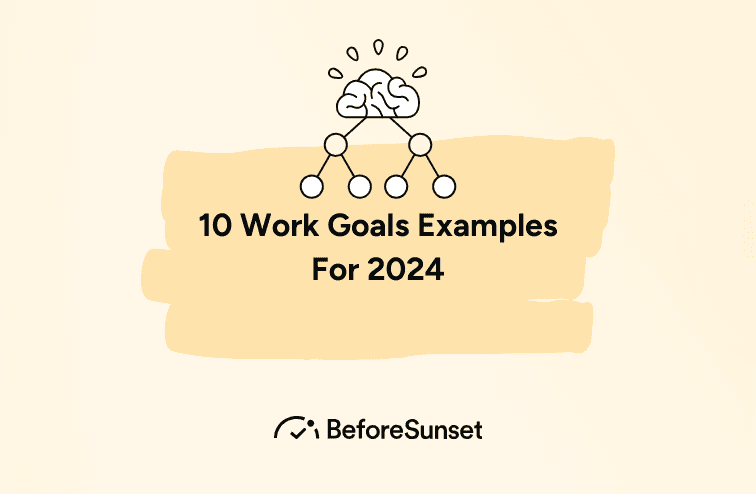The 10 Work Goals Examples For 2024, have you tried setting goals yet? The 2024 Work Goals Examples listed here are actionable and easier to put into practice. If you haven't set any personal or business goals yet, then this blog is for you.
The Importance Of Setting Work Goals
Establishing objectives for your job is crucial for professional development and career advancement. Setting work goals is crucial for the following reasons:
Clarity and Direction: By setting clear and detailed professional objectives, you may more easily determine what you want to accomplish in your career and receive guidance on how to do it. You can prioritize your efforts and concentrate on the correct things thanks to this clarity.
Clear work objectives offer you something to strive for, which boosts your motivation and determination to achieve. This supports your commitment to sticking with your plan and staying focused.
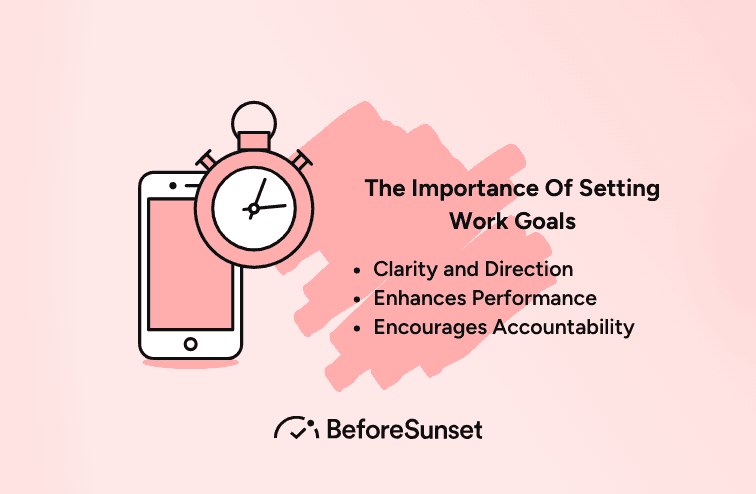
Enhances Performance: Establishing work objectives allows you to concentrate on important areas that need development and improves performance. You may use it to gauge your progress and pinpoint areas that require work.
Establishing work objectives may help you discover areas where your abilities and knowledge need to be improved, which promotes personal growth. This aids in your capacity improvement and promotes personal development.
Encourages Accountability: Making work objectives teaches you to take responsibility for your own development and accomplishments. You may take charge of your career and go forward with your goals thanks to it.
You might also like:
Professional Development Goals
In order to succeed, one must have clear, quantifiable professional growth objectives. The success of an individual can be traced to their personal development objectives. How does someone who has accomplished their professional development goals appear?
This may be defined as people who are able to solve problems and make wise career decisions in fast-paced circumstances. They must also have a demonstrated and highly developed technical competence and a broad knowledge base of the most recent technology breakthroughs.
1. Learn a New Skill or Technology that is Relevant to your Job
Setting a goal to learn a new skill or technology relevant to your field of work is a fantastic way to boost your professional growth and career advancement. To be relevant and valuable to your company in today's ever-changing workplace, it's crucial to stay up to date on the latest advances in your industry.
By learning a new skill or technology, you may improve your professional performance, increase your prospects of progression, and boost your confidence and self-esteem. Acquiring a new skill or technology may also promote personal growth by encouraging you to diversify your knowledge and talents.
As a consequence, setting a goal to learn a new skill or technology is a prudent and practical way to manage your career and stay competitive in the job market.
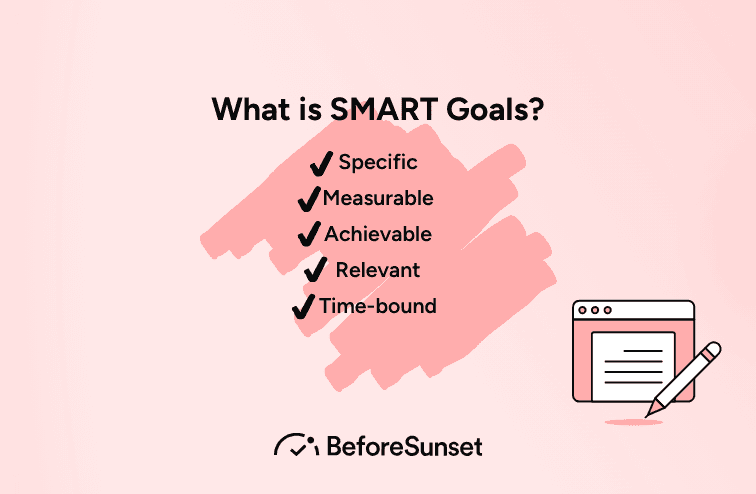
What is SMART Goals?
SMART goals are a framework for creating targets that are:
Specific
Measurable
Achievable
Relevant
Time-bound
This acronym assists individuals and teams in setting realistic goals and ambitious goals.
Specificity ensures that goals are well-defined and targeted, making it clear what has to be completed.
Measurability indicates that progress toward a goal may be measured and assessed using quantifiable measures or criteria.
Achievability emphasizes developing realistic goals while taking into account available resources and capabilities.
Relevance guarantees that the aim is in line with larger objectives and adds significantly to the individual or organization's mission.
Time-bound refers to a deadline or timetable for attaining a goal, creating a sense of urgency and accountability.
Individuals and teams can use the SMART goal framework to design goals that are more likely to be achieved effectively and efficiently, resulting in increased success and productivity.
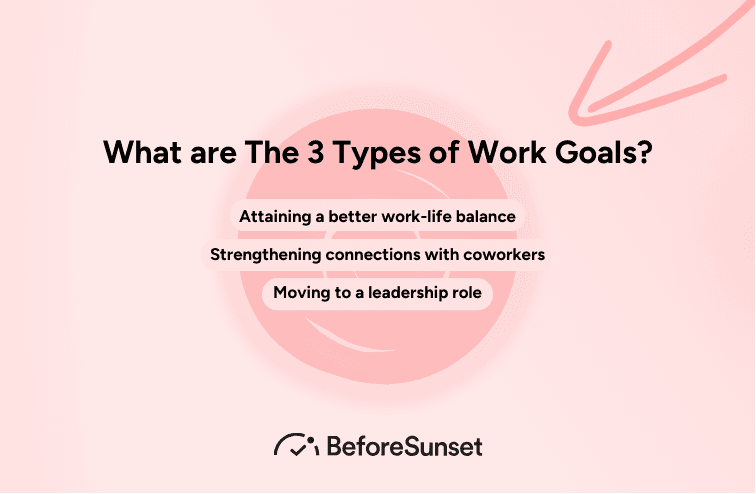
The 3 Types of Work Goals
Work goals are often divided into three categories: performance goals, developmental goals, and personal goals. Performance goals are aimed at reaching particular outcomes or targets within a set time range.
These goals are frequently linked to key performance indicators (KPIs) and may include objectives such as raising sales income, boosting customer satisfaction scores, or fulfilling project deadlines.
Developmental goals, on the other hand, are focused on improving skills, knowledge, and capacities in order to enable long-term career progress and success. These objectives may include activities such as attending training programs, obtaining certificates, or doing demanding projects to increase skills.
Personal ambitions in the workplace refer to an employee's aims and desires outside of their professional tasks.
These goals could include:
Attaining a better work-life balance
Strengthening connections with coworkers
Moving to a leadership role
Employees may effectively drive their performance, development, and general workplace satisfaction by defining and pursuing goals in all three areas.
Goal Setting for Career and Productivity
Successful people don't just navigate their careers – they chart their course with intention. To truly thrive in today's dynamic professional landscape, mastering the art of goal setting is essential.
Effective goals act as your personal roadmap, guiding you toward both professional goals and personal goals, ultimately enhancing your overall productivity.
The Building Blocks of Effective Goals:
Before diving into specific goals, let's build a strong foundation. Start by understanding your current role, its job responsibilities, and the demand skills within your industry. Consider your current skills and identify areas for development. Next, develop a growth mindset, believing in your ability to learn and improve.
Types of Goals:
Now, let's explore the different types of goals you can set:
Short-term goals: Achievable milestones within a specific time frame (e.g., monthly goals).
Long-term goals: Ambitious goals with a longer time horizon (e.g., career aspirations).
Outcome goals: Focus on the desired end result (e.g., landing a promotion).
Measurable goals: Quantifiable goals with clear metrics to track progress (e.g., complete online courses to improve public speaking skills).
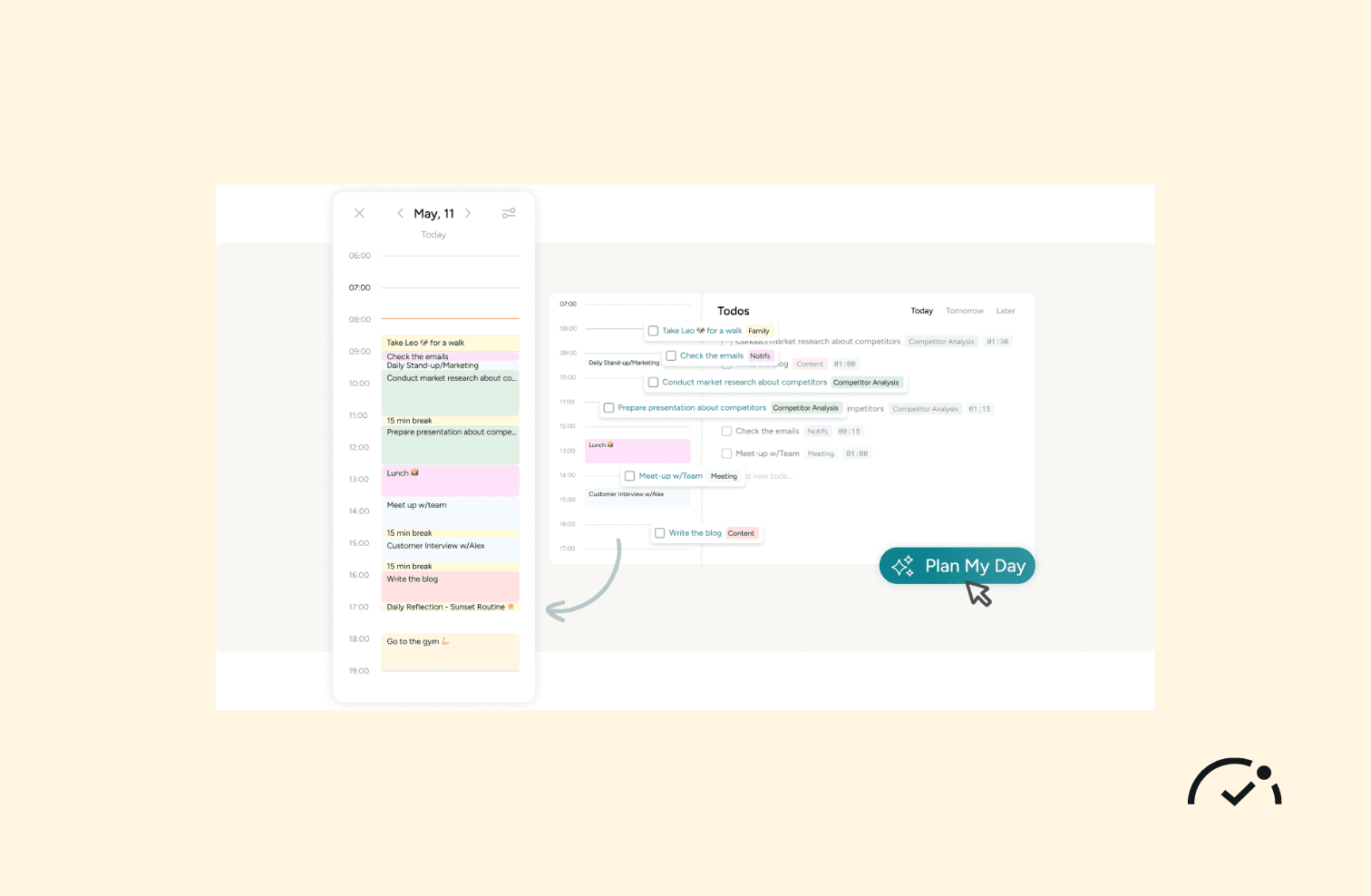
Conquering Work Goals with BeforeSunset AI
The pressure's on. Performance reviews are looming, and showcasing your accomplishments and future goals is crucial. But feeling overwhelmed by disorganized tasks and a chaotic schedule?,
BeforeSunset AI steps in as your secret weapon, helping you conquer your long-term career goals and impress during your review.
Mastering Soft Skills and Leadership:
Let's face it, excelling in your role goes beyond technical skills. BeforeSunset AI empowers you to hone your soft skills and leadership capabilities.
With its focus on team collaboration, you can utilize the "Invite/Work with team" feature to seamlessly collaborate with colleagues, fostering a strong work ethic and demonstrating your leadership potential.
Imagine brainstorming sessions and delegating tasks, all within a streamlined platform.
Time Management for Peak Performance:
Performance reviews often assess your ability to manage time effectively. BeforeSunset AI boasts a comprehensive suite of features to make you a time management champion.
Time-blocking: Construct your ideal workday using the time-blocking technique. This ensures you dedicate focused attention to each priority, showcasing your organizational skills.
Time-tracking: Ever wonder where time goes? BeforeSunset AI's built-in time tracker provides valuable insights into your workflow. Analyze your data and identify areas for improvement, demonstrating a data-driven approach to optimization.
Recurring To-Dos: Don't get bogged down by repetitive tasks. Set up recurring to-dos for routine administrative duties, freeing up valuable time for strategic projects. This highlights your ability to prioritize and manage your workload efficiently.
Preparation is Key: Owning Your Performance Review
Performance reviews are a two-way street. BeforeSunset AI empowers you to prepare by:
Goal Setting: Utilize BeforeSunset AI's features to set SMART goals (Specific, Measurable, Achievable, Relevant, and Time-bound) for the upcoming review period.
Personal Analytics: Analyze your productivity score and identify areas where you've excelled. This data provides concrete evidence of your accomplishments.
Prioritization Powerhouse: The prioritization tags within BeforeSunset AI ensure you tackle the most important tasks first. This demonstrates your ability to make sound judgments and prioritize effectively.
BeforeSunset AI: Your Ally for Success
BeforeSunset AI transcends a simple to-do list app. It's a mindful companion that equips you with the tools and insights needed to achieve your work goals and shine during your performance review. It allows you to showcase your soft skills, leadership potential, and sharp time management abilities. So, ditch the overwhelm and embrace the power of organization. BeforeSunset AI is your key to a successful review and a trajectory towards continued professional growth.

